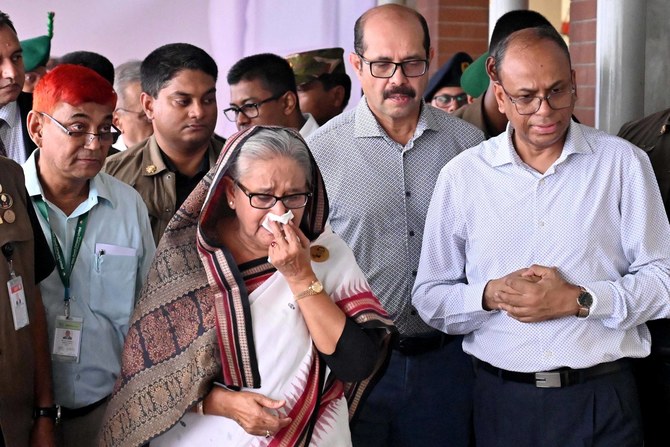NEW DELHI: Bangladesh’s ousted Prime Minister Sheikh Hasina, who is currently taking refuge in India, has accused the US of playing a role in her removal from power as she promised a prompt return to Dhaka.
Hasina was forced to resign and fled to neighboring India on Aug. 5, following weeks of nationwide demonstrations and a deadly crackdown on protesters, which emboldened a student-led movement to oust her regime after 15 years of uninterrupted rule.
The 76-year-old said Washington was to blame for her ouster in a message issued for supporters of her Awami League party, which appears to be her first statement since she left Dhaka.
“I resigned, so that I did not have to see the procession of dead bodies. They wanted to come to power over the dead bodies of students, but I did not allow it. I resigned from the premiership. I could have remained in power if I had surrendered the sovereignty of Saint Martin Island and allowed America to hold sway over the Bay of Bengal,” she said in a statement, which was first reported by India’s English-language daily The Economic Times.
“I beseech the people of my land, ‘Please do not be manipulated by radicals.’”
Hasina was referring to St. Martin’s Island, Bangladesh’s sole coral reef island located in the northeastern part of the Bay of Bengal, alluding to years-old rumors claiming that the US was seeking control over the island to turn it into a military airbase.
The US Embassy in Dhaka did not immediately respond to Arab News’ request for comment on Sunday.
“If I had remained in the country, more lives would have been lost, more resources would have been destroyed. I made the extremely difficult decision to exit. I became your leader because you chose me, you were my strength,” Hasina said.
“With the grace of almighty Allah, I will return soon. The Awami League has stood up again and again. I shall forever pray for the future of Bangladesh, the nation which my great father strived for. The country for which my father and family gave their lives.”
Hasina, 76, was one of the world’s longest-ruling female leaders and has played a pivotal role in Bangladesh’s politics, a nation of about 170 million people that declared its independence in 1971.
She is the daughter of Sheikh Mujibur Rahman, the country’s charismatic founding leader, who was killed in 1975 in a military coup when Hasina was 28. She served as prime minister from 1996 to 2001 and regained power in 2009.
Under her leadership, Bangladesh became one of the fastest-growing economies in the region, with World Bank estimates showing that more than 25 million people in the country have been lifted out of poverty in the last two decades.
But critics say she has grown increasingly autocratic and called her a threat to the country’s democracy, with many saying that the sudden collapse of Hasina’s government had reflected a broader discontent against her rule.
The student-led demonstrations that began peacefully in July were against a quota system for government jobs, which was widely criticized for favoring those with connections to the ruling party.
The rallies then turned violent as security forces clashed with protesters, leading to the killings of at least 300 people and the arrests of around 11,000 others, triggering new protests that culminated in a civil disobedience movement that forced Hasina’s resignation.






















